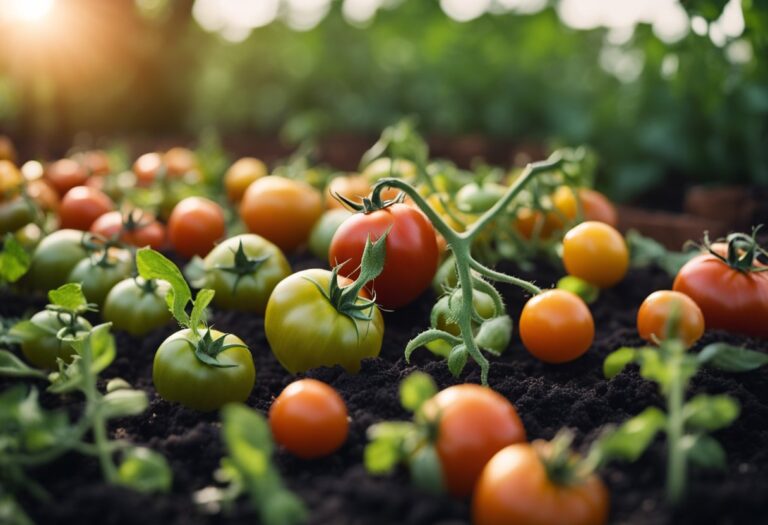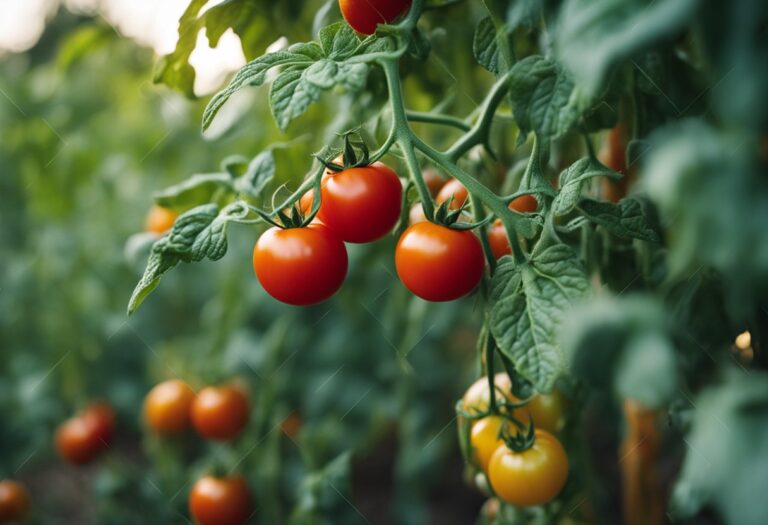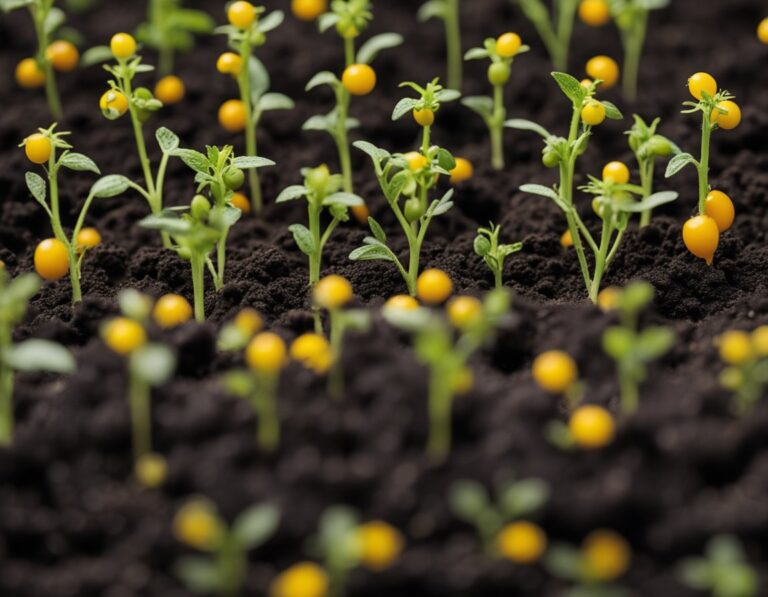Is Coffee Grounds Beneficial for Tomato Plants?
If you’re an avid gardener, you may have heard that using coffee grounds in your tomato garden can be beneficial.
But is it true? Can coffee grounds really help your tomato plants thrive? The answer is yes, coffee grounds can be good for tomato plants, but it’s important to understand the benefits and potential risks before using them in your garden.
Using coffee grounds in your tomato garden can provide several benefits. For one, coffee grounds are a great source of nitrogen, phosphorus, and potassium, which are essential nutrients for tomato plants.
Additionally, coffee grounds can help improve soil structure and water retention, which can lead to healthier plants and higher yields. However, it’s important to use coffee grounds correctly to avoid potential risks such as over-fertilization, soil acidity, and fungal growth.
Key Takeaways
- Coffee grounds can be beneficial for tomato plants due to their nutrient content and ability to improve soil structure and water retention.
- When using coffee grounds in your tomato garden, it’s important to use them correctly to avoid potential risks such as over-fertilization, soil acidity, and fungal growth.
- Alternatives to coffee grounds for tomato plants include other organic fertilizers and soil amendments such as compost, manure, and bone meal.
Is Coffee Grounds Good for Tomato Plants?
If you’re an avid gardener, you may have heard that coffee grounds can be beneficial for tomato plants. But is it true? Let’s dive into the pros and cons of using coffee grounds for your tomato plants.
Pros of Using Coffee Grounds for Tomato Plants
- Nutrient-rich soil: Coffee grounds contain essential nutrients such as nitrogen, phosphorus, and potassium that are beneficial for plant growth. These nutrients can help improve the quality of the soil, making it more fertile for your tomato plants.
- Natural pest deterrent: Coffee grounds can act as a natural pest deterrent for your tomato plants. The caffeine in the coffee grounds can repel slugs, snails, and other pests that can damage your plants.
- Improves soil structure: Coffee grounds can help improve the structure of the soil by increasing its porosity and water-holding capacity. This can help prevent soil compaction and improve drainage, which is essential for healthy tomato plants.
Cons of Using Coffee Grounds for Tomato Plants
- Acidity: Coffee grounds are slightly acidic, which can be harmful to some plants, including tomatoes. However, the acidity of coffee grounds is relatively low and can be easily neutralized by adding some lime to the soil.
- Overuse: Using too many coffee grounds can be detrimental to your tomato plants. The high nitrogen content in coffee grounds can lead to excessive foliage growth at the expense of fruit production.
- Risk of fungal growth: Coffee grounds can promote fungal growth in the soil, which can be harmful to your tomato plants. To avoid this, it’s essential to mix the coffee grounds with other organic materials such as leaves or sawdust before using them as a soil amendment.
How to Use Coffee Grounds for Tomato Plants
If you decide to use coffee grounds for your tomato plants, here are some tips to keep in mind:
- Use in moderation: Use coffee grounds in moderation to avoid over-fertilizing your plants. A general rule of thumb is to use about 1/2 cup of coffee grounds per plant.
- Mix with other organic materials: To avoid the risk of fungal growth, mix the coffee grounds with other organic materials such as leaves or sawdust before using them as a soil amendment.
- Apply as a mulch: You can also use coffee grounds as a mulch around your tomato plants. Apply a 1/2 inch layer of coffee grounds around the base of the plants, making sure not to cover the stems.
Benefits of Coffee Grounds for Tomato Plants
If you’re a tomato gardener, you’re probably always looking for ways to improve the health and yield of your plants.
One natural and cost-effective way to do this is by using coffee grounds as a fertilizer. Here are some benefits of using coffee grounds for tomato plants:
1. Rich in Nitrogen
Coffee grounds are rich in nitrogen, which is an essential nutrient for plant growth. Nitrogen is necessary for the development of healthy leaves and stems, and it also helps plants produce more fruit.
By adding coffee grounds to your tomato plants, you’re giving them a boost of nitrogen that will help them grow strong and healthy.
2. Improves Soil Quality
Coffee grounds can also improve the quality of your soil. They contain organic matter that helps to loosen compacted soil, allowing water and air to circulate more freely.
This can improve drainage and reduce the risk of waterlogging, which can lead to root rot. Additionally, coffee grounds can help to increase the pH of acidic soil, making it more alkaline and better suited for tomato plants.
3. Repels Pests
Coffee grounds can also help to repel pests like slugs and snails. These pests don’t like the texture or smell of coffee grounds, so they’ll avoid areas where they’re present.
By sprinkling coffee grounds around the base of your tomato plants, you can deter these pests and protect your plants from damage.
4. Cost-Effective
Using coffee grounds as a fertilizer is a cost-effective way to improve the health and yield of your tomato plants. Instead of spending money on expensive fertilizers, you can use a waste product that you probably already have in your kitchen. Plus, using coffee grounds as a fertilizer is an eco-friendly way to reduce waste and improve the health of your plants.
Keep in mind that while coffee grounds can be beneficial for tomato plants, they should be used in moderation. Too much coffee grounds can make the soil too acidic, which can harm your plants. Aim to use no more than 20% coffee grounds in your soil or compost mix. Also, be sure to use coffee grounds that have been used and dried, as fresh coffee grounds can be too acidic for plants.
By using coffee grounds as a fertilizer for your tomato plants, you can improve their health and yield while also reducing waste and saving money. Give it a try and see the benefits for yourself!
How to Use Coffee Grounds in Your Tomato Garden
If you’re a coffee lover and a tomato gardener, you’ll be happy to know that coffee grounds can be a beneficial addition to your tomato garden. Coffee grounds are rich in nitrogen, which is an essential nutrient for plant growth. Here are some tips on how to use coffee grounds in your tomato garden.
Preparation of Coffee Grounds
Before you use coffee grounds in your tomato garden, it’s important to prepare them properly. Here’s how:
- Dry the coffee grounds: Spread out the coffee grounds on a baking sheet and let them dry for a day or two. This will prevent mold growth and make the coffee grounds easier to handle.
- Compost the coffee grounds: Coffee grounds are acidic, so it’s important to balance the pH level of your soil. Composting the coffee grounds with other organic materials like leaves, grass clippings, and eggshells can help balance the pH level and add nutrients to the soil.
Application Methods
Once you have prepared your coffee grounds, there are several ways to use them in your tomato garden. Here are some application methods:
- Mulch: Spread a 1/2 inch (1.3 cm) layer of fresh coffee grounds around tomato plants to retain moisture. The natural chemicals found in coffee grounds may suppress weed seed germination.
- Soil amendment: Mix the dried coffee grounds with the soil before planting your tomato plants. This will provide nitrogen to the soil and help your tomato plants grow strong.
- Compost tea: Mix the composted coffee grounds with water to create a compost tea. Use this mixture to water your tomato plants. The compost tea will provide nutrients to the soil and help your tomato plants grow healthy.
- Fertilizer: Mix the dried coffee grounds with other organic fertilizers like bone meal or blood meal to create a nutrient-rich fertilizer for your tomato plants.
Remember to use coffee grounds in moderation. Too much coffee grounds can make the soil too acidic and harm your tomato plants. A half-pound of coffee grounds per tomato plant is a good balance of nutrients.
Potential Risks and Downsides
While coffee grounds can provide some benefits to tomato plants, it’s important to be aware of the potential risks and downsides associated with their use.
Acidity
Coffee grounds are notably acidic, which can be harmful to some plants. However, the acidity of coffee grounds is often overstated.
In reality, coffee grounds are only slightly acidic, with a pH of around 6.5. This is actually close to the ideal pH range for many plants, including tomatoes.
Caffeine
Coffee grounds contain residual caffeine, which can inhibit the growth of both seedlings and mature plants.
If you have young tomato plants or have just put in seeds, it’s best to not have coffee grounds anywhere near these. However, if your tomato plants are already established, the caffeine in coffee grounds is unlikely to cause any harm.
Mold and Fungus
Coffee grounds are a good source of nitrogen, which is important for plant growth. However, they can also attract mold and fungus.
This is especially true if you use too many coffee grounds or don’t allow them to dry out properly before adding them to your soil. To avoid this problem, make sure to use coffee grounds in moderation and mix them well with other organic matter.
Nutrient Imbalance
While coffee grounds are a good source of nitrogen, they don’t contain all the nutrients that tomato plants need. If you rely solely on coffee grounds to fertilize your tomato plants, you may end up with a nutrient imbalance.
To avoid this, it’s important to use a variety of organic fertilizers, such as compost, bone meal, and fish emulsion.
Pesticide Residues
Coffee is often treated with pesticides, which can leave residues on the coffee grounds. If you use coffee grounds that are contaminated with pesticides, you may end up exposing your tomato plants to harmful chemicals.
To avoid this, it’s best to use organic coffee grounds or coffee grounds that have been certified as pesticide-free.
Overall, coffee grounds can be a valuable addition to your tomato garden, but it’s important to use them in moderation and be aware of the potential risks and downsides. By using coffee grounds in combination with other organic fertilizers, you can provide your tomato plants with the nutrients they need to thrive.
Alternatives to Coffee Grounds for Tomato Plants
While coffee grounds can provide benefits to tomato plants, they are not the only option available. Here are some alternatives to consider:
1. Compost
Composting is a great way to provide nutrients to your tomato plants. By composting kitchen scraps, yard waste, and other organic materials, you can create a nutrient-rich soil amendment that will benefit your plants. Compost is also a great way to improve soil structure and retain moisture.
2. Eggshells
Eggshells are a great source of calcium, which is important for tomato plants. Crushed eggshells can be added to the soil around your plants to provide a slow-release source of calcium. Eggshells can also help to deter slugs and snails, which can be a problem for tomato plants.
3. Fish Emulsion
Fish emulsion is a liquid fertilizer made from fish waste. It is a great source of nitrogen, which is important for plant growth. Fish emulsion can be applied directly to the soil around your tomato plants or used as a foliar spray.
4. Seaweed
Seaweed is a great source of micronutrients, which are important for plant growth. Seaweed can be added to the soil as a mulch or used as a foliar spray. Seaweed can also help to improve soil structure and retain moisture.
5. Bone Meal
Bone meal is a great source of phosphorus, which is important for root growth and flower development. Bone meal can be added to the soil around your tomato plants to provide a slow-release source of phosphorus.
While coffee grounds can provide benefits to tomato plants, there are many other options available. Consider using compost, eggshells, fish emulsion, seaweed, or bone meal to provide nutrients to your tomato plants. By using a variety of soil amendments, you can create a healthy and productive garden.
Frequently Asked Questions
Can coffee grounds be used as a fertilizer for vegetable gardens?
Yes, coffee grounds can be used as a fertilizer for vegetable gardens, including tomato plants. Coffee grounds are rich in nitrogen, phosphorus, and potassium, which are essential nutrients that plants need to grow.
When coffee grounds are added to the soil, they slowly release these nutrients, providing a natural and organic source of fertilizer for your plants.
What are the benefits of using coffee grounds on plants?
Aside from being a natural fertilizer, coffee grounds also have other benefits for plants. They can improve soil structure and drainage, increase water retention, and help prevent soil erosion.
Coffee grounds also contain antioxidants, which can help protect plants from diseases and pests.
How do coffee grounds affect tomato plant growth?
Coffee grounds can help tomato plants grow by providing them with essential nutrients such as nitrogen, phosphorus, and potassium. They can also help improve soil structure and drainage, which can promote healthy root growth.
However, it is important to note that coffee grounds should be used in moderation, as too much can make the soil too acidic, which can harm tomato plants.
Are there any plants that should not be fertilized with coffee grounds?
While coffee grounds can be beneficial for many plants, there are some plants that should not be fertilized with them.
Plants that prefer alkaline soil, such as azaleas, rhododendrons, and blueberries, may not tolerate the acidity of coffee grounds. Additionally, plants that are sensitive to caffeine, such as some herbs and vegetables, may also be adversely affected by coffee grounds.
Can coffee grounds attract pests to tomato plants?
There is some debate about whether coffee grounds can attract pests to plants. While some gardeners have reported that coffee grounds can attract slugs and snails, others have not had this problem.
To minimize the risk of attracting pests, it is recommended to use coffee grounds sparingly and to avoid applying them directly to the plant stem.
What is the best way to apply coffee grounds to tomato plants?
There are several ways to apply coffee grounds to tomato plants. One option is to mix them into the soil before planting. Another option is to use coffee grounds as a mulch around the base of the plant.
To avoid over-acidifying the soil, it is recommended to use no more than 20% coffee grounds in the soil or as a mulch. Additionally, it is important to avoid applying coffee grounds too close to the plant stem, as this can cause damage.



